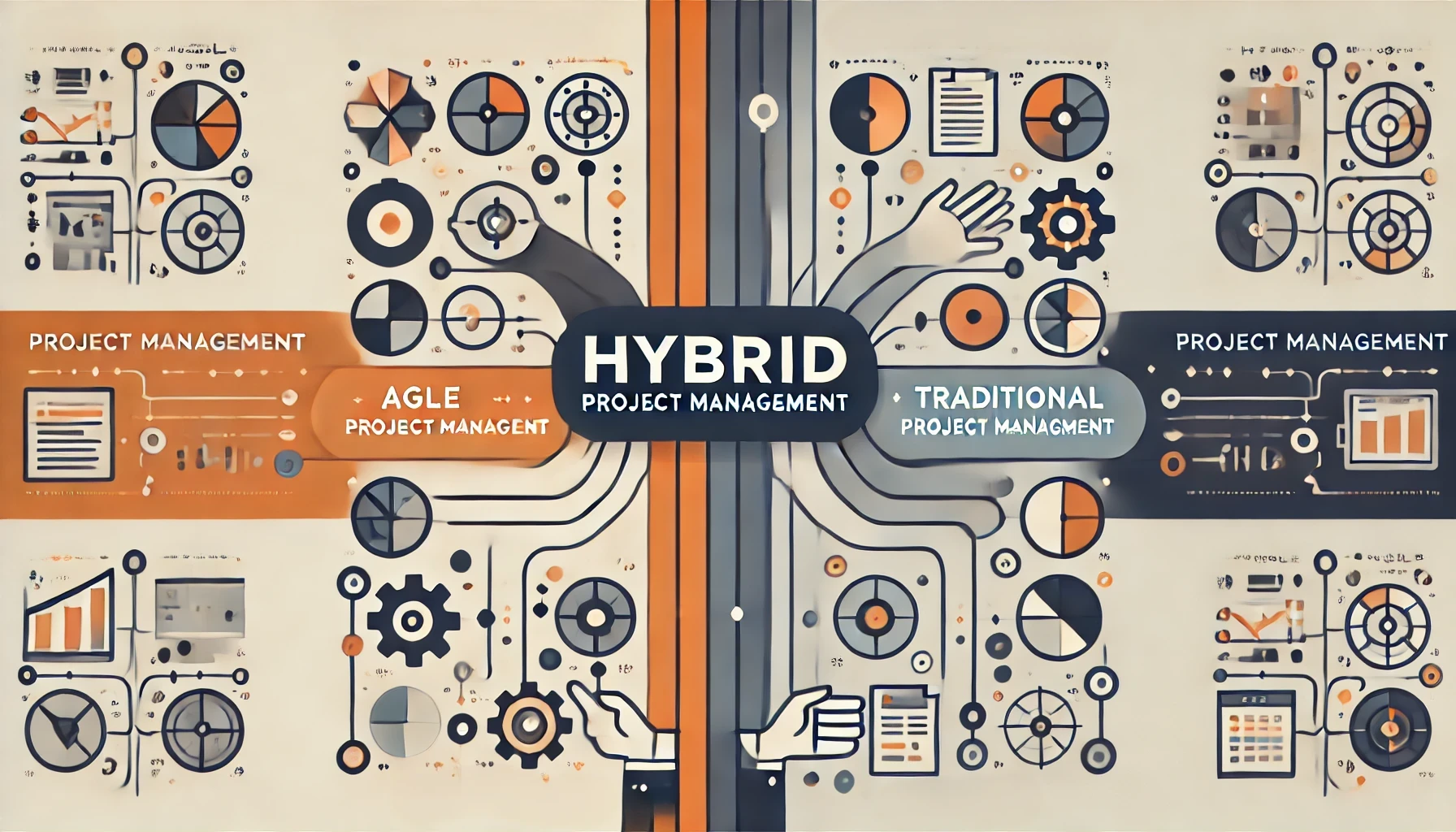Introduction
In the ever-evolving landscape of project management, organisations are increasingly recognising that a one-size-fits-all approach doesn’t always yield the best results. Enter Hybrid Project Management – a flexible and adaptive methodology that combines the best elements of traditional and Agile project management approaches. This innovative strategy allows project managers to tailor their methods to the specific needs of each project, maximising efficiency and effectiveness.
In this comprehensive guide, we’ll explore the concept of Hybrid Project Management, its benefits, key components, and practical implementation strategies. Whether you’re a seasoned project manager or new to the field, understanding this versatile approach can help you navigate complex projects with greater success.
Understanding Hybrid Project Management
What is Hybrid Project Management?
Hybrid Project Management is an approach that blends elements of traditional (often Waterfall) and Agile methodologies. It allows project teams to leverage the structure and predictability of traditional methods alongside the flexibility and iterative nature of Agile practices. This combination enables organisations to adapt their project management style to suit the unique requirements of each project or phase within a project.
The core idea behind Hybrid Project Management is to create a tailored approach that capitalises on the strengths of both worlds:
- Traditional methods offer clear structure, detailed planning, and defined processes.
- Agile methodologies provide flexibility, rapid iteration, and continuous improvement.
By combining these approaches, project managers can create a more balanced and adaptable framework that suits complex, multi-faceted projects.
Benefits of Hybrid Project Management
Adopting a Hybrid approach to project management can offer numerous advantages:
- Increased Flexibility: Hybrid models allow teams to adapt their approach as project needs evolve, combining the predictability of traditional methods with the adaptability of Agile.
- Improved Risk Management: By incorporating elements of both methodologies, teams can better identify and mitigate risks throughout the project lifecycle.
- Enhanced Stakeholder Satisfaction: The blend of detailed planning and iterative development can lead to better alignment with stakeholder expectations and more frequent deliverables.
- Optimised Resource Utilisation: Hybrid approaches allow for more efficient use of resources by applying the most appropriate methodology to each project phase or component.
- Better Suited for Complex Projects: For projects with diverse requirements or multiple teams, a Hybrid approach can provide the necessary structure and flexibility to manage complexity effectively.
- Smoother Transition: For organisations moving from traditional to Agile methods, Hybrid Project Management can serve as a bridge, facilitating a gradual and less disruptive transition.
Key Components of Hybrid Project Management
A successful Hybrid Project Management approach typically incorporates the following key components:
1. Flexible Planning
While maintaining an overall project roadmap, Hybrid approaches allow for more detailed short-term planning and frequent reassessment. This combines the long-term vision of traditional methods with the adaptability of Agile sprints.
2. Iterative Development
Incorporating Agile principles, Hybrid models often use iterative development cycles. This allows for regular product increments and opportunities for feedback and adjustment throughout the project.
3. Continuous Communication
Emphasising open and frequent communication among team members and stakeholders is crucial in Hybrid Project Management. This facilitates better collaboration and quicker problem-solving.
4. Balanced Documentation
Hybrid approaches strike a balance between comprehensive documentation (typical in traditional methods) and the “just enough” documentation philosophy of Agile. The level of documentation is tailored to project needs and stakeholder requirements.
5. Adaptive Governance
Governance in Hybrid projects is flexible, combining formal stage gates or milestones with more frequent, less formal check-ins and reviews typical of Agile methodologies.
6. Mixed Team Structures
Hybrid projects often involve a mix of specialist roles (common in traditional projects) and cross-functional teams (typical in Agile environments), depending on the project phase and requirements.
Implementing Hybrid Project Management
Successfully implementing a Hybrid Project Management approach requires careful planning and execution. Here are some strategies to help you get started:
1. Assess Project Characteristics
Begin by evaluating the nature of your project. Consider factors such as:
- Project complexity and size
- Stakeholder requirements and involvement
- Team experience and preferences
- Regulatory or compliance needs
- Degree of uncertainty or potential for change
This assessment will help you determine which elements of traditional and Agile methodologies are most appropriate for your project.
2. Define a Tailored Framework
Based on your project assessment, create a customised framework that outlines:
- Overall project structure (phases, sprints, or a combination)
- Planning and estimation methods
- Reporting and documentation requirements
- Review and approval processes
- Team roles and responsibilities
Ensure this framework is flexible enough to adapt as the project progresses and new insights emerge.
3. Establish Clear Communication Channels
Set up robust communication channels that facilitate both formal reporting (for traditional elements) and informal, frequent interactions (for Agile components). This might include:
- Regular status meetings and reports
- Daily stand-ups or check-ins
- Collaborative tools for real-time information sharing
- Stakeholder engagement sessions
Clear communication is vital for ensuring all team members and stakeholders are aligned and informed throughout the project.
4. Implement Appropriate Tools
Select project management tools that support your Hybrid approach. Look for solutions that offer:
- High-level project planning and tracking
- Detailed task management and prioritisation
- Resource allocation and capacity planning
- Reporting and analytics capabilities
- Collaboration features
Many modern project management tools offer customisable interfaces that can accommodate both traditional and Agile methodologies.
5. Foster a Hybrid Mindset
Encourage your team to embrace the Hybrid approach by:
- Providing training on both traditional and Agile methodologies
- Emphasising the benefits of flexibility and adaptability
- Encouraging experimentation and learning from both approaches
- Celebrating successes that demonstrate the value of the Hybrid model
Creating a culture that values the strengths of both methodologies is crucial for successful Hybrid Project Management.
6. Continuously Evaluate and Adjust
Regularly assess the effectiveness of your Hybrid approach and be prepared to make adjustments. This might involve:
- Gathering feedback from team members and stakeholders
- Analysing project metrics and outcomes
- Identifying areas where one methodology might be more effective than the other
- Making iterative improvements to your Hybrid framework
Remember, the key to successful Hybrid Project Management is adaptability – be willing to refine your approach based on project needs and team feedback.
Conclusion
Hybrid Project Management offers a flexible and powerful approach to managing complex projects in today’s dynamic business environment. By combining the structure and predictability of traditional methods with the adaptability and iterative nature of Agile, organisations can create tailored project management strategies that drive success.
As you explore Hybrid Project Management, remember that there’s no one-size-fits-all solution. The key is to understand the principles of both traditional and Agile methodologies and blend them in a way that best suits your project’s unique needs and challenges.
Ready to enhance your project management skills and learn more about implementing Hybrid approaches? Explore Project Success Hub’s range of project management courses and resources to take your project management capabilities to the next level and drive success in your projects!






0 Comments